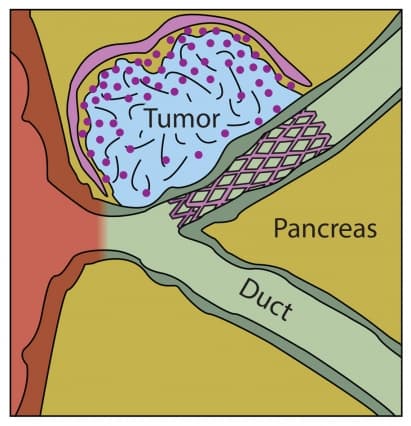Newly Devised Implantable Chip Could Significantly Increase Pancreatic Cancer Survival Rates
Cancer, the worlds’ deadliest disease has crippled the human civilization for long, and a proper cure to it is still not in sight. According to the MIT press report, pancreatic cancer is labelled as the third leading cause for Cancer deaths, having only a 6% survival rate. The reason they state is that, chemotherapy drugs and radiology treatment are unable to precisely hit the target area, which is hidden inside our abdomen. To change this chronic complication in medical science, a group of researchers from MIT and Massachusetts General Hospital has fabricated a small implantable chip which will act as a messenger of therapeutics.
Laboratory experiments have proved that the system efficiency is 12 times more in mice than what is achieved in current intravenous injections. Laura Indolfi, a lead author of this study explained that the chip can localize the drugs to distinct places in order to control tumor progression. This method helps to shrink the tumor to a size where surgeons can successfully remove it. Inspired by a project named “Bridge Projectâ€, the scientists started their journey with the main focus on pancreas cancer. As mentioned earlier, Pancreas is very hard to reach not only because it is placed in the deep abdomen, but also because it has a fibrous protective coating which does not allow external drugs to hit the organ and also, some blood vessels which act in a drug resistant manner.

The way the film has covered the tumorTo overcome this complex barrier, the team manufactured a polymer film from PLGA, which can be easily rolled with a narrow tube and placed on the tumor using catheter. The drug is then layered over the film and preprogrammed with a timer in such a way that once the instrument touches the tumor, it starts working. Additionally, the whole process needs the lowest surgical effort since rather than being a target-hitter, it protects other organs from its high medicinal effects.
When applied on mice, the team realized it shrunk the tumor size and increased the necrotic tissues (dead cancer cells) which is easily removable from the body. Moreover, as the film works as a physical barrier, it heavily reduced the effect of metastasis (programmable cell death) in nearby organs. Practically, this method is minimally invasive and works in favor of the patient. Currently, the group is planning to apply this procedure on humans and also expand the method in case of other type of internal organ related cancers. The complete research report was published in the journal 'Biomaterials'.
Source: <a href="https://news.mit.edu/2016/implantable-device-targets-pancreatic-cancer-0414" target="_blank" rel="nofollow noopener noreferrer">Implantable device targets pancreatic cancer | MIT News | Massachusetts Institute of Technology</a>
Laboratory experiments have proved that the system efficiency is 12 times more in mice than what is achieved in current intravenous injections. Laura Indolfi, a lead author of this study explained that the chip can localize the drugs to distinct places in order to control tumor progression. This method helps to shrink the tumor to a size where surgeons can successfully remove it. Inspired by a project named “Bridge Projectâ€, the scientists started their journey with the main focus on pancreas cancer. As mentioned earlier, Pancreas is very hard to reach not only because it is placed in the deep abdomen, but also because it has a fibrous protective coating which does not allow external drugs to hit the organ and also, some blood vessels which act in a drug resistant manner.

The way the film has covered the tumor
When applied on mice, the team realized it shrunk the tumor size and increased the necrotic tissues (dead cancer cells) which is easily removable from the body. Moreover, as the film works as a physical barrier, it heavily reduced the effect of metastasis (programmable cell death) in nearby organs. Practically, this method is minimally invasive and works in favor of the patient. Currently, the group is planning to apply this procedure on humans and also expand the method in case of other type of internal organ related cancers. The complete research report was published in the journal 'Biomaterials'.
Source: <a href="https://news.mit.edu/2016/implantable-device-targets-pancreatic-cancer-0414" target="_blank" rel="nofollow noopener noreferrer">Implantable device targets pancreatic cancer | MIT News | Massachusetts Institute of Technology</a>
0
